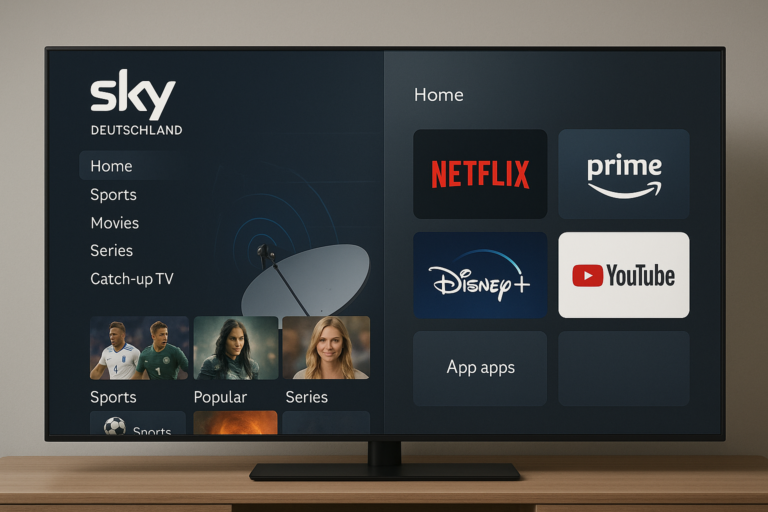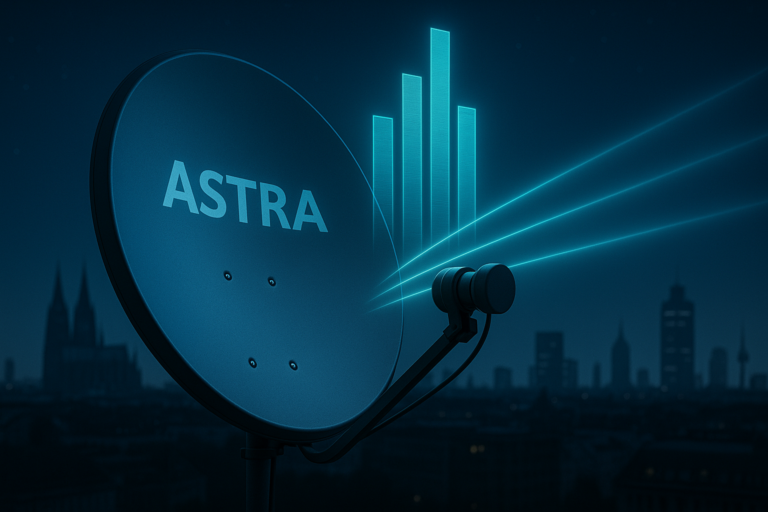Watch IPTV in Germany – Full Beginner’s Guide

Watch IPTV in Germany [2025 Beginner’s Guide: Legal Providers, Setup, Pros & Cons]
Watching TV has changed a lot in Germany, with IPTV now topping the list for flexible, on-demand shows and live sports. IPTV stands for Internet Protocol Television, which basically means you can stream channels and shows online instead of relying on cable or satellite. It’s no wonder so many Germans are switching over, thanks to wider device support, more regional channels, and better streaming quality.
If you’re new, this beginner’s guide has your back. You’ll learn what IPTV really is, how legal services work, the easiest ways to set things up, and what to expect before subscribing. We’ll keep things simple, walk you through legal questions, and give real answers so you can watch stress-free.
What Is IPTV and How Does It Work?
IPTV is short for Internet Protocol Television. This means you watch TV over your internet connection, not through a satellite dish or a cable running into your house. In Germany, more people are choosing IPTV because it lets you stream your favorite shows, sports, and movies on almost any device. If you’re used to watching regular cable or satellite TV, IPTV might feel like an upgrade. Let’s break down what makes IPTV tick and why it’s different from the TV setups you might already know.
IPTV Explained in Simple Words
With IPTV, your TV shows and movies arrive using the same technology as YouTube, Spotify, or WhatsApp calls—the internet. There’s no need for a big satellite dish or coaxial cable. Instead, you connect using your regular home Wi-Fi or ethernet cable. Once you subscribe to a legal IPTV provider, you log in and start streaming. It’s that easy.
What does this mean for you? You get:
- Flexible device support: Watch on smart TVs, smartphones, tablets, laptops, or streaming sticks like Fire TV.
- On-demand and live TV: See shows as they air or dive into huge libraries of movies and past episodes.
- Better streaming quality: If your internet is fast and stable, you’ll notice less lag and higher video quality.
IPTV services deliver content in packets (think of them as digital envelopes) across the web. This is similar to how email works, but the packets carry video and sound. Your app or device puts those packets back together so it looks and sounds like regular TV.
For a technical overview, check out this helpful breakdown: What is IPTV (Internet Protocol television) and how does it work?.
IPTV vs Cable/Satellite TV: What’s the Difference?
The move from cable or satellite TV to IPTV is like switching from mailing letters to sending instant messages. Cable TV broadcasts signals through physical wires buried in the ground. Satellite TV beams everything down from space. Both require special boxes and installations.
With IPTV, there’s no need to wait for a technician or drill holes in your wall. You simply sign up, download the app, and start watching. Here’s a quick comparison to make things clear:
- Content delivery: IPTV uses the internet; cable TV uses coaxial cables; satellite TV uses dishes.
- Device freedom: IPTV works on almost any device. Cable and satellite are limited to your TV and set-top box.
- Channel lineups: All options offer lots of channels, but IPTV can include extras like on-demand shows, local channels from different places, and catch-up TV.
Need a quick side-by-side view? This article lays it out: IPTV Vs Cable TV: Key Differences to Know Which is Better?.
Live Streams and On-Demand: The Two Pillars of IPTV
One thing that sets IPTV apart is its support for both live and on-demand content.
- Live TV: Streams channels as they broadcast, great for news and sports.
- On-demand library: Lets you choose what to watch and when, including movies, series, and even past episodes.
This mix gives you the kind of control that traditional TV never managed. Missed a show? Just stream it later. Want to pause live soccer? IPTV lets you do that, too, depending on your provider.
In short, IPTV uses the web to make TV flexible. You watch what you want, when you want, and where you want—no extra hardware needed.
Is IPTV Legal in Germany?
The legality of IPTV in Germany depends on one big thing: licensing. Watching your favorite series or live Bundesliga matches is completely legal—when you use a provider with the right licenses for its content. But if you stumble across a super cheap (or free) service that offers hundreds of channels from around the world, that’s a red flag. There are big differences between approved providers and illegal streams, and knowing these details can help keep you out of trouble.
 Photo by Neo Lee
Photo by Neo Lee
Licensed IPTV Providers vs. Pirated Streams
Legal IPTV services in Germany are licensed. This means the provider has made deals with TV networks, movie studios, and channel owners, and pays for the right to show those programs. You can usually spot these providers because they:
- Clearly display official logos or channel lists.
- Offer customer support, proper invoices, and transparent subscription terms.
- Comply with local tax and consumer protection rules.
- Feature well-known brands (example: Zattoo, Waipu.tv, Joyn Plus+, Sky Ticket, DAZN, and Netflix).
You can see a complete list of some reliable options here: Best 10 IPTV Service Providers in Germany (2025 Updated).
On the other side, pirated IPTV streams are illegal. They don’t have permission from content owners. Warning signs include:
- Offers that sound too good to be true (like 5,000 channels for €10/month).
- No official company address or legal info.
- Payment options like Bitcoin, gift cards, or payment apps only.
- No VAT (sales tax) or proper billing.
- Private or password-only Facebook groups to join.
Authorities are strict on this. According to recent updates, IPTV is legal in Germany, but the rules are strict and consuming illegal services leads to harsh penalties.
Penalties for Using Illegal IPTV Services
If you’re caught using illegal IPTV services, the consequences can hit harder than people think. Here are the possible outcomes:
- Fines
- Watching pirated IPTV content is a copyright violation. Fines can reach into the thousands of euros per household.
- Everyday example: A family using an illegal streaming box for cheap Bundesliga games could be sent a hefty fine after an ISP investigation.
- Service Blockage
- Internet providers in Germany cooperate with the authorities to block access to pirated IPTV servers.
- If you suddenly can’t open streams that once worked, your ISP might have blocked access due to a legal request.
- ISP Actions
- ISPs can send warning letters, slow your internet speed, or in some cases, cut off your service after repeat offenses.
- Example: You’re streaming a Champions League match and receive a notice from your ISP, warning that your activities were flagged as unlawful.
- Criminal Charges
- Especially if you share or resell illegal IPTV streams, German police may pursue criminal charges that could lead to further legal action.
German authorities are actively shutting down pirate IPTV networks and prosecuting those involved. Read more on recent actions: German authorities dismantle pirate IPTV network.
The risks go beyond legal trouble. Illegal IPTV sites might also expose your personal data to scammers or install malware on your devices, creating even bigger problems.
In short, using licensed IPTV providers keeps you safe, legal, and headache-free. When it comes to streaming in Germany, sticking with trusted services is always the smarter move.
Top Legal IPTV Providers in Germany (2025)
Legal IPTV providers in Germany offer a simple, flexible way to stream both live and on-demand TV on just about any device. Whether you want to catch Bundesliga matches, binge on series, or need on-the-go access, the right provider makes all the difference. Here’s a look at the top options trusted in 2025—including their pros, cons, and what helps each one stand out.
Popular German IPTV Providers (with Quick Pros & Cons)
German IPTV services are easy to use and most have apps for smart TVs, smartphones, streaming sticks, and web browsers. Here’s what you should know about today’s most popular options.
Waipu.tv
A favorite for those who love channel variety.
- Pricing: Affordable plans starting from about €7/month.
- Channels: 200+ channels (regional, international, themed).
- Device Support: Android, iOS, Apple TV, Fire TV, Chromecast, smart TVs, and web.
- Streaming Quality: Up to Full HD, fast channel change.
- Pros: Strong channel lineup, easy cloud recording, family sharing, great for German and some international channels.
- Cons: No sports bundles like Sky, some premium channels cost extra.
Zattoo
Perfect for quick set-up and no long-term contracts.
- Pricing: Free tier (ad-supported), Premium from €9.99/month.
- Channels: 160+ (includes all major German broadcasters).
- Device Support: Almost everything—smart TVs, Chromecast, mobile, laptops, Xbox, and web.
- Streaming Quality: Up to Full HD; stable streaming even on slower Wi-Fi.
- Pros: Good free plan, easy on multiple devices, cancel anytime, includes pause and restart for live TV.
- Cons: Free plan has ads and some restrictions, HD and EU-wide streaming require upgrade.
MagentaTV
A strong pick if you already have Telekom internet.
- Pricing: Starts from €10/month, bundles with internet available.
- Channels: Around 100+ channels, strong integration with ARD, ZDF, and local stations.
- Device Support: Smart TVs, MagentaTV box, mobile, browser.
- Streaming Quality: HD (4K on select channels).
- Pros: Great for families, reliable service, easy bundle options, unique extras (cloud recording, on-demand library).
- Cons: Best prices only with Telekom contract, outside users pay more.
Sky (Sky Ticket/Sky Q)
Still the go-to for live sports and blockbuster entertainment.
- Pricing: Sports or entertainment passes start from €14.99/month.
- Channels: Sports, movies, exclusive channels (including Bundesliga, Champions League).
- Device Support: Sky Q box, smart TVs, mobile, PC, consoles.
- Streaming Quality: Full HD, some content in 4K.
- Pros: Top-tier for live sports, exclusive shows and movies, on-demand titles.
- Cons: Can get pricey with multiple passes, contracts lock you in longer-term.
DAZN
Your best bet for streaming live sports without a satellite or cable plan.
- Pricing: Packages start from €29.99/month.
- Channels: Sports streaming (Bundesliga, Champions League, boxing, NBA, NFL).
- Device Support: Smart TVs, Apple TV, Fire TV, mobile apps, browser.
- Streaming Quality: Full HD.
- Pros: Sports-first approach, lots of exclusive events, flexible packages.
- Cons: Focused on sports only, no regular entertainment channels.
For even more provider options and details, see this 2025 list of the best IPTV service providers in Germany.
Free & Ad-Supported Options
Free IPTV platforms make it simple for everyone to try out internet TV. They don’t require contracts or fees, but come with some ads and a smaller channel lineup.
Pluto TV
A legal, no-cost platform with a quirky selection of themed channels.
- Pros:
- 100% free and legal.
- Runs on almost any device—smart TVs, streaming sticks, apps, and browsers.
- Streams news, movies, kids’ shows, documentaries, and several quirky channels (like “Star Trek” or classic crime).
- Cons:
- Ads interrupt programs.
- Limited live German channels.
- No on-demand sports or mainstream new releases.
XUMO
Another free service with a channel “grid” feel.
- Pros:
- No sign-up needed, free access.
- Available for smart TVs, mobile, and desktop.
- Covers news, entertainment, comedy, and some European-focused programs.
- Cons:
- Fewer German channels than Pluto TV.
- No pause/rewind on live TV.
- Occasional ad breaks.
Both Pluto TV and XUMO work best as casual solutions. You’ll get a taste of internet TV without spending a cent, but for full German channel lists or premium content, paid options are better. For additional legal IPTV resources and consultable lists, see this guide: Best Legal IPTV Options For Germany (2025).
How To Set Up IPTV in Germany: Step-by-Step
Ready to kick back and start streaming? Setting up IPTV in Germany isn’t difficult, but it does take a little planning. Let’s break it down: first, pick the provider that fits your needs, then get your devices and apps set up, and finally, make sure your streams play smoothly without hiccups.
Picking the Right Provider for You
Before anything else, take a minute to list what you actually want from an IPTV subscription. Germany offers a mix of local channels, global news, binge-worthy series, and live sports, but not every provider is strong in every area. Here’s how to weigh your options:
Think about:
- Sports: Bundesliga, Formula 1, or Champions League? Check the lineups for Sky, DAZN, or Zattoo.
- News and local shows: Want all the big German broadcasters like ARD, ZDF, and ProSieben? Look for complete local packages in services such as Waipu.tv or MagentaTV.
- International content: Fans of British, US, or Turkish channels should check for packages that offer these extras.
- Device support: Do you watch mostly on a smart TV, or do you want options for firesticks, tablets, and phones? Some services cover all, others are limited.
- Budget: Plans start at €7/month for basics and can climb if you add sports or international bundles. Always compare value, not just price.
If you’re focusing on sports or international movies, look for reviews or community feedback online. The Best IPTV for Germany in 2025 thread offers fresh tips straight from real users. You can also see a curated list of leading platforms in this IPTV Services Guide.
Device Setup and Installing IPTV Apps
Once you’ve subscribed to a provider, it’s time to get streaming on your favorite screen. Let’s cover the basics for each major device:
 Photo by Barbaros Kaya
Photo by Barbaros Kaya
Smart TV:
Most new TVs from Samsung, LG, and Android TV brands support IPTV apps. Popular apps include Smart IPTV (SIPTV), Net IPTV, and IPTV Smarters Pro.
- Open your TV’s app store.
- Search and install your chosen app (for example, “IPTV Smarters Pro” or “Net IPTV”).
- Open the app and enter your provider’s M3U playlist URL or login credentials.
Firestick/Fire TV:
Easy to set up and portable for any room.
- From your Firestick home, search for and download “IPTV Smarters Pro” or “Smart IPTV.”
- Open the app, then input your playlist link or Xtream codes.
For a complete walk-through, check this Firestick IPTV setup guide.
Smartphone or Tablet:
Great for streaming on the go.
- Android users: Download Smarters Pro, TiviMate, or GSE Smart IPTV from the Play Store.
- iPhone/iPad users: Download Smarters Player Lite or IPTVX from the App Store.
- Log in using details from your provider (playlist link or username/password).
PC or Mac:
Want to use your laptop or desktop?
- Download VLC Media Player or IPTV Smarters Player for Windows/Mac.
- Open the app, select “Open Network Stream,” and paste in your playlist URL.
Need more in-depth instructions? The Smart TV and Firestick IPTV setup tutorial walks through the whole process with screenshots.
Getting the Best Streaming Quality
No one wants their big movie night ruined by glitches or spinning wheels. Here’s how to make sure your IPTV runs smooth as butter:
Check your internet speed:
A minimum of 8–10 Mbps is necessary for HD streaming. If you want 4K, aim for at least 25 Mbps.
WiFi vs. cable:
WiFi works fine for most homes, but a wired ethernet connection is much more stable. For crowded apartments or thick walls, even a simple network cable can stop buffering dead in its tracks.
Tweak app settings:
- Lower the default streaming resolution if your internet has bad days.
- Try using built-in “auto quality” settings to allow the stream to adjust smoothly.
- Clear the app cache or restart your device regularly to keep things zippy.
Avoid peak hours:
Streaming during evening rush can cause lag on slower connections. Test playback at different times if you see issues.
With the right combination of provider, device, and connection tweaks, you’ll enjoy hassle-free IPTV streaming in Germany every day.
Trends, Tips, and Staying Safe with IPTV in Germany
IPTV isn’t just about swapping your cable for streaming anymore. People across Germany are watching more TV than ever through internet-based services, and 2025 is full of fresh twists. From smarter content suggestions to sharper video and faster connections, it pays to know what’s new, what to watch out for, and how to keep your streams secure. Let’s break down the latest trends, smart tips, and ways to protect your privacy while using IPTV in Germany.
New Trends in German IPTV: What’s Hot in 2025
Keeping up with TV can feel like trying to drink from a fire hose, thanks to technology changes. Here’s what’s shaping the way Germans stream this year:
- AI-Powered Recommendations: Services use artificial intelligence to suggest shows and movies that actually match your tastes. The more you watch, the better it gets at knowing what fits your mood.
- 5G and 4K Ultra HD: Fast 5G rollout and expanded fiber networks deliver speed and quality. Most top IPTV providers now stream in crisp 4K, and 5G means smooth, buffer-free sports or movie nights even on mobile.
- Personalized and Interactive Features: Expect options like live chat during shows, custom channel guides, and family profiles. Social sharing and polls during major events are on the rise.
- Voice Control and Smart Devices: More people use smart speakers and remotes to change channels, launch shows, or get recommendations without lifting a finger.
- Eco-Friendly Streaming: Some providers optimize streams to save power or reduce data, helping the planet while you binge.
For a peek at how these trends keep evolving, the article on OTT IPTV trends at ANGA COM 2025 explains how hybrid models, 5G, and smarter analytics are transforming European streaming.
Smart Tips for a Better IPTV Experience
Want the best from your IPTV service in Germany? Use these practical tips to get the most reliable, high-quality entertainment:
- Pick Trusted Providers: Use legal services that list official channels, offer customer support, and publish transparent pricing.
- Check Device Compatibility: Make sure your chosen provider works with all your devices—smart TV, tablet, phone, or streaming stick. This saves time later.
- Secure a Fast Connection: Connect with fiber, DSL, or a solid WiFi link to avoid buffering, especially when streaming 4K. Wired connections are often best for main living rooms.
- Use Quality Apps: Download IPTV players with good reviews, regular updates, and built-in security features. The OPUS IPTV Player guide offers clear setup steps.
- Try Interactive Features: Experiment with social sharing, multi-view screens, or live polls during big events for a more personal viewing experience.
There are even more tips in this detailed rundown: Essential Features and Practical Tips for IPTV.
Staying Safe: Avoid Scams and Protect Your Privacy
Streaming TV should be easy, but scams and privacy threats do exist. To keep your data (and wallet) safe while enjoying IPTV in Germany, stick to these habits:
- Choose Licensed Providers Only: Never give money to random sellers on social media or websites with zero company info. Stick to well-known or locally registered options.
- Look for HTTPS and Legal Info: Always use providers with secure (https://) sites and visible legal details, billing, and proper contacts. Sketchy payment methods or hidden terms are red flags.
- Protect Your WiFi and Accounts: Set strong passwords for your IPTV apps and WiFi router. Don’t share account access with strangers.
- Know the Warning Signs: If an offer sounds way too cheap, says “unlimited everything,” or dodges VAT/invoice info, walk away. Scams often hide behind free trials that demand full payment later.
- Update Devices Regularly: Check for app and device updates. These often include fixes to block bugs, malware, or data leaks.
If you ever feel lost or question if something is safe, check official German consumer sites or visit resource hubs like this comprehensive setup and streaming guide for extra help on staying legitimate.
Germany’s IPTV scene is fast-moving, flexible, and packed with ways to watch, but a little care keeps it fun and secure. Stay alert, stay legal, and enjoy the streaming revolution.
Conclusion
To get the best IPTV experience in Germany, always stick with licensed providers that offer clear legal terms and real customer support. Set up your devices with apps that work well and suit your routine, whether you’re streaming on a smart TV, tablet, or phone. Pay attention to your internet connection for smooth, high-quality video every time you watch.
These simple steps protect you from legal trouble and tech headaches, letting you actually enjoy watching TV. Streaming is meant to be simple and fun—so keep it safe, match your service to your needs, and you’ll be set for a stress-free start.
If you’re just getting into IPTV, relax and enjoy the flexibility. Legal streaming in Germany opens up more options than ever before. Thanks for reading—share your experience or tips below to help others start strong!





